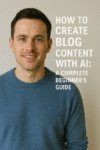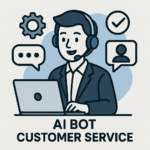Introduction to AI Healthcare Tools 2025: Revolutionizing Medical Care
In 2025, AI healthcare tools are transforming how doctors diagnose, treat, and manage patients across the globe. From early cancer detection to faster emergency response, these intelligent systems are making medical care more accurate and accessible. Whether it’s a remote village or a big-city hospital, AI healthcare tools in 2025 are playing a key role in improving lives. Let’s explore the top 30 AI-powered healthcare innovations changing the face of modern medicine.
In 2025, AI is not just a futuristic concept—it’s already deeply integrated into hospitals, clinics, and research labs around the world. Whether it’s analyzing X-rays within seconds, predicting the risk of chronic diseases, or even assisting with surgeries, AI is proving to be a game-changer in every corner of the medical field.
best AI-Generated Code Checker Visit Now
Why AI Healthcare Tools in 2025 Are a Game-Changer for Moder
Handling Massive Medical Data with AI Healthcare Analytics 2025
To begin with, healthcare generates enormous amounts of data daily, including electronic health records and medical imaging. AI helps analyze this data quickly and accurately, which enables doctors to make faster and m
Accurate and Early Diagnoses Enabled by AI Healthcare Technology 2025
Moreover, AI can de
Automation of Adminis
In addition, AI automates administrative duties like paperwork and appointment scheduling. Consequently, medical staff are freed up to concentrate more on patient care thanks to AI healthcare automation solutions in 2025.
Remote Patient Monitoring with AI Wearable Healthcare Devices 2025
Furthermore, AI-powered wearables now monitor patients continuously, sending real-time alerts in case of any emergencies, showcasing the power of AI remote monitoring tools in 2025.
Personalized Treatment Plans Using AI Healthcare Data Analysis 2025
AI also contributes to creating personalized treatment plans by analyzing a patient’s genetic data and medical history. Therefore, treatments become more targeted and effective through AI-driven healthcare personalization in 2025.
Top AI Healthcare Tools Transforming Medicine in 2025
1. Google Health AI: Leading AI Diagnostic Tools for 2025
Google Health AI leverages advanced machine learning to analyze medical images such as X-rays and MRIs. It not only helps doctors detect diseases like cancer earlier but also enhances diagnostic accuracy. In addition, it processes vast amounts of electronic health records to uncover potential risks. What’s more, it integrates smoothly into hospital systems, providing real-time insights without disrupting daily operations. Due to its focus on data privacy, patient information stays secure. Furthermore, by collaborating with global partners, Google continuously improves its AI models for diverse populations — a prime example of AI healthcare tools in 2025.
2. IBM Watson Health: AI-Powered Cancer Treatment Tools 2025
IBM Watson Health is especially beneficial for oncologists seeking optimal cancer treatments. It analyzes clinical trial data, research papers, and patient records to offer personalized therapy recommendations. Additionally, Watson updates itself with the latest studies, ensuring clinicians receive evidence-based insights. Apart from oncology, it supports various medical specialties and automates administrative workflows, thereby allowing doctors to spend more time with patients.
3. Path AI: AI-Powered Pathology Innovations for Healthcare 2025
Path AI enhances pathology using deep learning to examine tissue samples more accurately than traditional techniques. As a result, diagnostic errors are minimized, and turnaround times are improved. Since it continuously learns from new data, it boosts efficiency in lab settings while increasing diagnostic confidence.
4. Aidoc: Emergency Imaging AI Tool for 2025
Aidoc focuses on emergency imaging. Its AI analyzes scans instantly to detect life-threatening conditions like brain hemorrhages and strokes. Consequently, doctors are alerted immediately, improving response times in critical moments. Moreover, it acts as a second set of eyes for radiologists, helping to reduce fatigue and minimize mistakes — an essential AI healthcare tool in 2025.
5. Zebra Medical Vision: AI Radiology Solutions in 2025
Zebra Medical Vision uses AI to interpret medical scans and detect numerous conditions. Not only does it support radiologists by improving diagnostic speed, but it also reduces the chances of oversight. Because its algorithms are trained on millions of scans, the system achieves exceptional accuracy.
6. Butterfly Network: Portable AI Ultrasound Devices in Healthcare 2025
Butterfly Network delivers a portable, AI-driven ultrasound device that’s both affordable and easy to use. This innovation democratizes imaging, especially in rural or underserved areas. Notably, the built-in AI guides users during scans, ensuring quality imaging regardless of the operator’s experience. In addition, the device connects to smartphones, offering greater flexibility in the field.
7. Viz.ai: AI-Powered Stroke Detection Tool for Hospitals in 2025
Viz.ai specializes in stroke detection by instantly analyzing CT scans with AI. If a stroke is detected, the system notifies hospital teams without delay. Therefore, treatment is initiated much faster, which is critical for reducing brain damage. Hospitals using Viz.ai have reported shorter intervention times and improved recovery rates. In essence, the tool saves lives by streamlining emergency responses — a significant advancement in AI healthcare tools for 2025.
8. Caption Health: Real-Time AI for Ultrasound Imaging 2025
Caption Health assists ultrasound technicians in real-time, ensuring that even less experienced operators can capture high-quality images. Thus, this technology standardizes ultrasound exams and reduces the likelihood of errors. It supports cardiac and obstetric imaging, making it useful in various medical settings — a top AI diagnostic tool in 2025.
9. Tempus: Personalized Cancer Care with AI in 2025
Tempus personalizes cancer treatment using AI to analyze genetic and clinical data. As a result, oncologists can tailor therapies to individual patients, increasing effectiveness and minimizing side effects. Moreover, it identifies appropriate clinical trials, thereby expanding access to cutting-edge treatments.
10. Freenome: AI-Powered Early Cancer Detection Tools 2025
Freenome creates AI-powered blood tests that detect cancer early using biomarkers. Unlike traditional biopsies, these liquid tests are non-invasive and offer early detection. Consequently, patients can begin treatment sooner, improving survival odds. Furthermore, the high accuracy of Freenome’s models minimizes false positives and negatives — a must-watch AI healthcare tool for 2025.
11. Buoy Health: AI Symptom Checker for Smart Patient Guidance 2025
Buoy Health acts as an AI symptom checker, guiding users to appropriate care by analyzing responses to a series of questions. Not only does it help reduce unnecessary ER visits, but it also empowers users with reliable health information. Over time, its AI becomes smarter, thanks to continuous data input.
12. AliveCor: Portable AI ECG Monitoring Devices for 2025
AliveCor provides a portable ECG device that allows patients to monitor their heart rhythms from home. The AI interprets the data instantly and flags abnormalities such as arrhythmias. Patients can share these results with their doctors in real time, enabling early intervention and reducing hospital visits.
13. Lunit: AI Imaging Tool for Lung and Breast Cancer Detection 2025
Lunit uses deep learning to detect lung and breast cancers early. Additionally, it enhances diagnostic accuracy by highlighting abnormal areas on medical images. Because early detection significantly improves survival rates, Lunit plays a crucial role in preventative care.
14. Insilico Medicine: AI for Accelerating Drug Discovery in 2025
Insilico Medicine accelerates drug discovery using AI to predict molecular interactions. This not only shortens development time but also cuts costs. Furthermore, it helps researchers design better drug candidates through iterative learning, leading to more effective medications.
15. Qure.ai: AI Detection Tool for Tuberculosis and Lung Conditions 2025
Qure.ai uses AI to identify lung diseases like tuberculosis from X-rays and CT scans. As a result, diagnoses are made faster, particularly in regions lacking radiologists. The tool greatly supports public health efforts in fighting infectious diseases.
16. DeepMind Health: AI for Protein Structure Prediction and Drug Discovery 2025
DeepMind Health advances drug discovery by predicting protein structures with AI. Since protein shape is vital for understanding disease mechanisms, this capability speeds up the development of new treatments. Their work is especially important in fields with unmet medical needs.
17. Babylon Health: Virtual AI Doctor and Telemedicine Tool 2025
Babylon Health offers AI-powered virtual doctor consultations. Patients can access healthcare remotely, and the AI triages symptoms to prioritize care. This model makes medical advice more accessible, particularly in areas with limited healthcare infrastructure.
18. Aidaptus: AI Risk Predictor for Chronic Disease Prevention 2025
Aidaptus predicts risks for chronic diseases by analyzing patient data. Consequently, at-risk individuals can receive early interventions. By doing so, it helps reduce healthcare costs and supports long-term wellness strategies.
19. Corti: Real-Time AI Assistant for Emergency Dispatchers 2025
Corti’s AI listens to emergency calls in real-time, identifying cardiac arrests and other critical issues. It provides dispatchers with instant insights, thereby improving emergency response times and saving lives — a cutting-edge AI tool in emergency healthcare.
20. Vizru Health: AI Public Health Analytics Platform 2025
Vizru Health utilizes AI to analyze public health data. By identifying emerging health trends and risk factors, it helps policymakers implement targeted interventions and improve community well-being.
21. Olive AI: AI-Powered Healthcare Administration Automation 2025
Olive AI automates repetitive administrative tasks like billing and claims. As a result, healthcare professionals spend less time on paperwork and more time with patients. It significantly boosts operational efficiency.
22. Arterys: Cloud-Based AI Cardiovascular Imaging Platform 2025
Arterys provides cloud-based AI solutions for cardiovascular imaging. It delivers rapid, detailed analyses to cardiologists, which enables better decision-making and quicker treatment.
23. NVIDIA Clara: Scalable AI Healthcare Platform for 2025
NVIDIA Clara offers a platform that powers AI-driven healthcare applications in diagnostics and research. Because it supports scalable deployment, hospitals and labs can easily adopt advanced tools.
24. Heart Flow: Non-Invasive AI Cardiology Imaging Tool 2025
Heart Flow generates 3D heart models using AI and CT scans. Doctors can then assess blockages without invasive procedures, enhancing both diagnosis and patient safety.
25. Enlitic: Deep Learning Tool for Tumor and Fracture Detection 2025
Enlitic uses deep learning to identify tumors and fractures in medical images. It acts as a smart assistant for radiologists, increasing diagnostic speed and reducing oversight.
26. K Health: Mobile AI Health Assistant for Personalized Care 2025
K Health is a mobile AI health assistant that offers tailored advice based on symptoms and medical history. Consequently, users can make informed decisions about their care anytime, anywhere.
27. Recursion Pharmaceuticals: AI-Powered Drug Discovery Automation 2025
Recursion combines robotics and AI to perform thousands of experiments simultaneously. In doing so, it rapidly identifies potential drug candidates, accelerating the entire pharmaceutical pipeline.
28. Proscia: AI Digital Pathology Solutions for Early Detection 2025
Proscia enhances digital pathology with AI that speeds up and refines tissue analysis. It supports early detection and reduces variability between human interpretations.
29. PathAI (Revisited): Consistent AI Diagnostic Support in Pathology 2025
Path AI, mentioned earlier, continues to lead in AI-powered pathology. It ensures consistency in diagnoses and strengthens overall confidence in clinical decisions.
30. Medable: AI for Optimizing Clinical Trials in 2025
Medable applies AI to optimize every stage of clinical trials. From patient recruitment to data collection, it streamlines processes and brings treatments to market faster.
Additional Benefits of AI Healthcare Tools in 2025: Beyond Diagnostics and Treatment
Improving Healthcare Equity with AI Medical Access Tools 2025
AI makes medical services more accessible in remote and underserved areas through innovative healthcare AI tools in 2025.
Enhanced Medical Training with AI-Powered Simulation Tools 2025
Simulated AI environments allow trainees to practice in safe, controlled settings, revolutionizing medical education with AI healthcare tools.
Real-Time Predictive Analytics Using AI Healthcare Software 2025
Hospitals use AI to anticipate complications and act before emergencies arise, showcasing the power of predictive AI healthcare tools in 2025.
Conclusion: The Future of AI Healthcare Tools in 2025 and Beyond
It’s clear that AI healthcare tools in 2025 are no longer just emerging technology—they have become an essential part of modern medicine. From revolutionizing diagnostics and speeding up drug discovery to automating administrative tasks and enabling virtual consultations, AI is reshaping healthcare delivery globally.
Healthcare systems embracing AI healthcare technology in 2025 will become more efficient, compassionate, personalized, and accessible for everyone.







